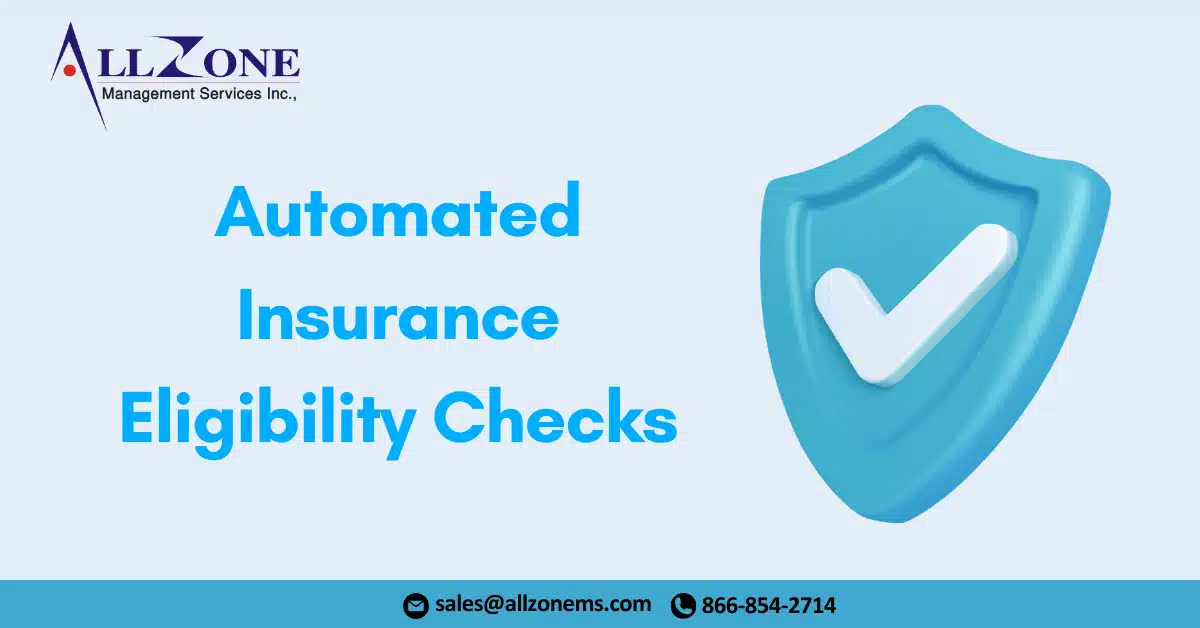| Table of Contents |
One significant challenge that healthcare providers face is the high rate of insurance claim denials and prolonged accounts receivable (AR) days. These issues can lead to substantial financial losses and operational inefficiencies. To address these challenges, healthcare providers are increasingly turning to automated insurance eligibility checks. This technology streamlines the verification process, reduces manual errors, and improves overall claim accuracy.
Understanding the Impact of Denials and AR Days
-
- Denials: When insurance claims are denied, it can lead to significant revenue loss. Denials can occur due to various reasons, including incorrect patient information, missing authorizations, or invalid billing codes.
- AR Days: AR days measure the average number of days it takes to collect payment for services rendered. Prolonged AR days can negatively impact cash flow and hinder the financial health of a healthcare organization.
The Role of Automated Insurance Eligibility Checks
Automated insurance eligibility checks are a powerful tool to mitigate the impact of denials and AR days. Here’s how they work:
-
- Real-time Verification: The system automatically verifies patient insurance eligibility in real-time, before services are rendered.
- Accurate Patient Information: The system ensures that patient information, such as name, date of birth, and insurance details, is accurate and up-to-date.
- Identification of Coverage Issues: The system can identify potential coverage issues, such as expired insurance, changes in benefits, or prior authorization requirements, before they lead to denials.
- Streamlined Claims Submission: By ensuring accurate and complete information, automated eligibility checks help streamline the claims submission process.
- Reduced Manual Effort: The automation of eligibility checks reduces the need for manual data entry and verification, freeing up staff time for other critical tasks.
Optimize Your Accounts Receivable for Maximum Cash Flow. |
Benefits of Automated Insurance Eligibility Checks
-
- Reduced Denials: By identifying and addressing potential issues upfront, automated eligibility checks significantly reduce the number of claim denials.
- Improved Cash Flow: Faster claim processing and reduced denials lead to improved cash flow and better financial performance.
- Enhanced Patient Experience: Real-time verification and accurate billing information contribute to a smoother and more efficient patient experience.
- Increased Operational Efficiency: Automation reduces manual effort, improves productivity, and streamlines workflows.
- Data-Driven Insights: Automated systems can generate valuable data and insights into claim trends, denial patterns, and other key performance indicators.
Implementing Automated Insurance Eligibility Checks
To effectively implement automated insurance eligibility checks, healthcare providers should consider the following steps:
- Choose the Right Technology: Select a robust and reliable eligibility verification system that integrates seamlessly with your existing EHR and Medical billing systems.
- Data Quality and Maintenance: Ensure that patient demographic and insurance information is accurate and up-to-date.
- Staff Training: Provide adequate training to staff on how to use the system and interpret the results.
- Regular Monitoring and Optimization: Continuously monitor the system’s performance and make necessary adjustments to optimize its effectiveness.
Conclusion
Automated insurance eligibility checks are a valuable tool for healthcare providers to reduce denials, improve AR days, and enhance overall revenue cycle management. By embracing this technology, healthcare organizations can achieve significant financial benefits, operational efficiencies, and improved patient satisfaction
Insurance Eligibility Verification Service: A Critical Step for Healthcare Practices
Insurance eligibility verification is an essential process for healthcare practices, ensuring accurate billing and reducing claim denials. Verifying a patient’s insurance details before providing services helps confirm coverage, co-pays, deductibles, and out-of-pocket costs. This proactive step minimizes errors and prevents costly delays in reimbursement.
With insurance policies frequently changing, eligibility verification guarantees that practices stay updated on the latest coverage details. It also enhances the patient experience by providing transparency about financial obligations upfront, reducing unexpected bills.
For healthcare providers, efficient verification reduces administrative burdens and streamlines operations, allowing staff to focus on patient care. Partnering with a reliable insurance eligibility verification service can further optimize this process, ensuring seamless communication with insurers and improving revenue cycle management.
In today’s complex healthcare landscape, eligibility verification is not just a necessity—it’s a foundation for financial stability and patient satisfaction.
|


